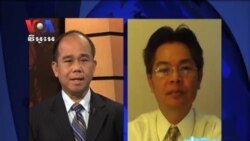WASHINGTON DC - Friday’s school shooting in Connecticut could affect some Khmer Rouge survivors living in the United States, according to Bunrath Math, a clinical social worker in Philadelphia.
More than 200,000 Cambodians resettled in the US in the 1970s and 1980s. Many of them were survivors of the Khmer Rouge. And many lost family members under the regime. Some of have spent years trying to get over the trauma. Some never have.
In a Skype interview with VOA Khmer, Bunrath Math warned that the shootings in Newtown, Conn., which left dead 20 children and eight adults, including the assailant, were powerful enough re-trigger symptoms of post-traumatic stress disorder in Khmer Rouge survivors.
“Any event, such as the one that happened last week, or even smaller events, can trigger memories of the past,” he said. “So this is really difficult. It causes us to avoid things associated with that trauma, avoid talking about it, thinking about it, or sharing our feelings.”
Symptoms of post-traumatic stress include sleeplessness, headaches and recurring nightmares, he said. As a survivor who lost family members to the Khmer Rouge, Bunrath Math urged parents to seek professional help if they themselves have symptoms, or see their children or grandchildren exhibiting them.
“Children sometimes become clingy, not wanting their parents to go to work or go anywhere because they are afraid,” he said. “That means it’s time to seek professional help and call your area facility for professional help right away.”
More than 200,000 Cambodians resettled in the US in the 1970s and 1980s. Many of them were survivors of the Khmer Rouge. And many lost family members under the regime. Some of have spent years trying to get over the trauma. Some never have.
In a Skype interview with VOA Khmer, Bunrath Math warned that the shootings in Newtown, Conn., which left dead 20 children and eight adults, including the assailant, were powerful enough re-trigger symptoms of post-traumatic stress disorder in Khmer Rouge survivors.
“Any event, such as the one that happened last week, or even smaller events, can trigger memories of the past,” he said. “So this is really difficult. It causes us to avoid things associated with that trauma, avoid talking about it, thinking about it, or sharing our feelings.”
Symptoms of post-traumatic stress include sleeplessness, headaches and recurring nightmares, he said. As a survivor who lost family members to the Khmer Rouge, Bunrath Math urged parents to seek professional help if they themselves have symptoms, or see their children or grandchildren exhibiting them.
“Children sometimes become clingy, not wanting their parents to go to work or go anywhere because they are afraid,” he said. “That means it’s time to seek professional help and call your area facility for professional help right away.”








